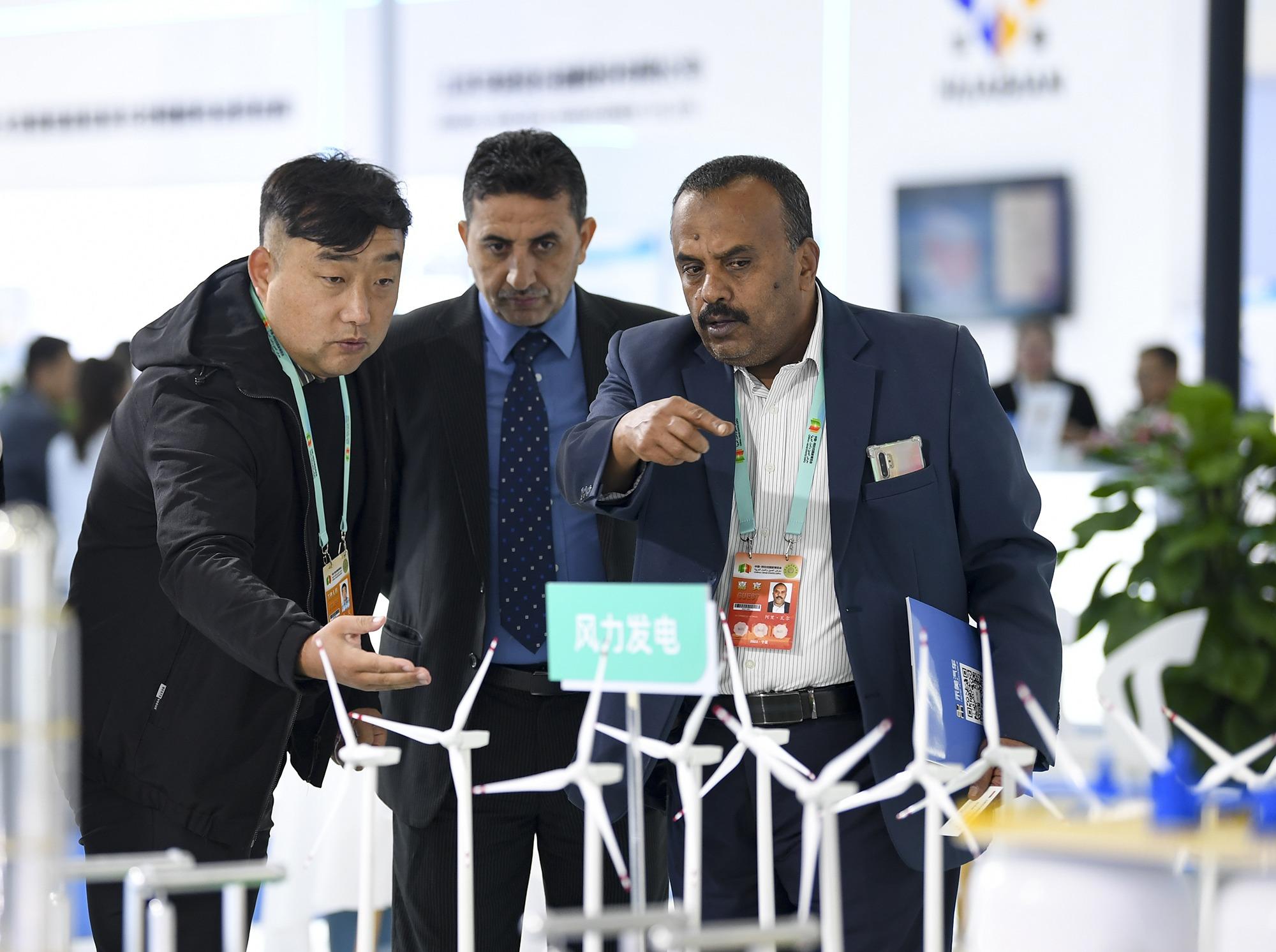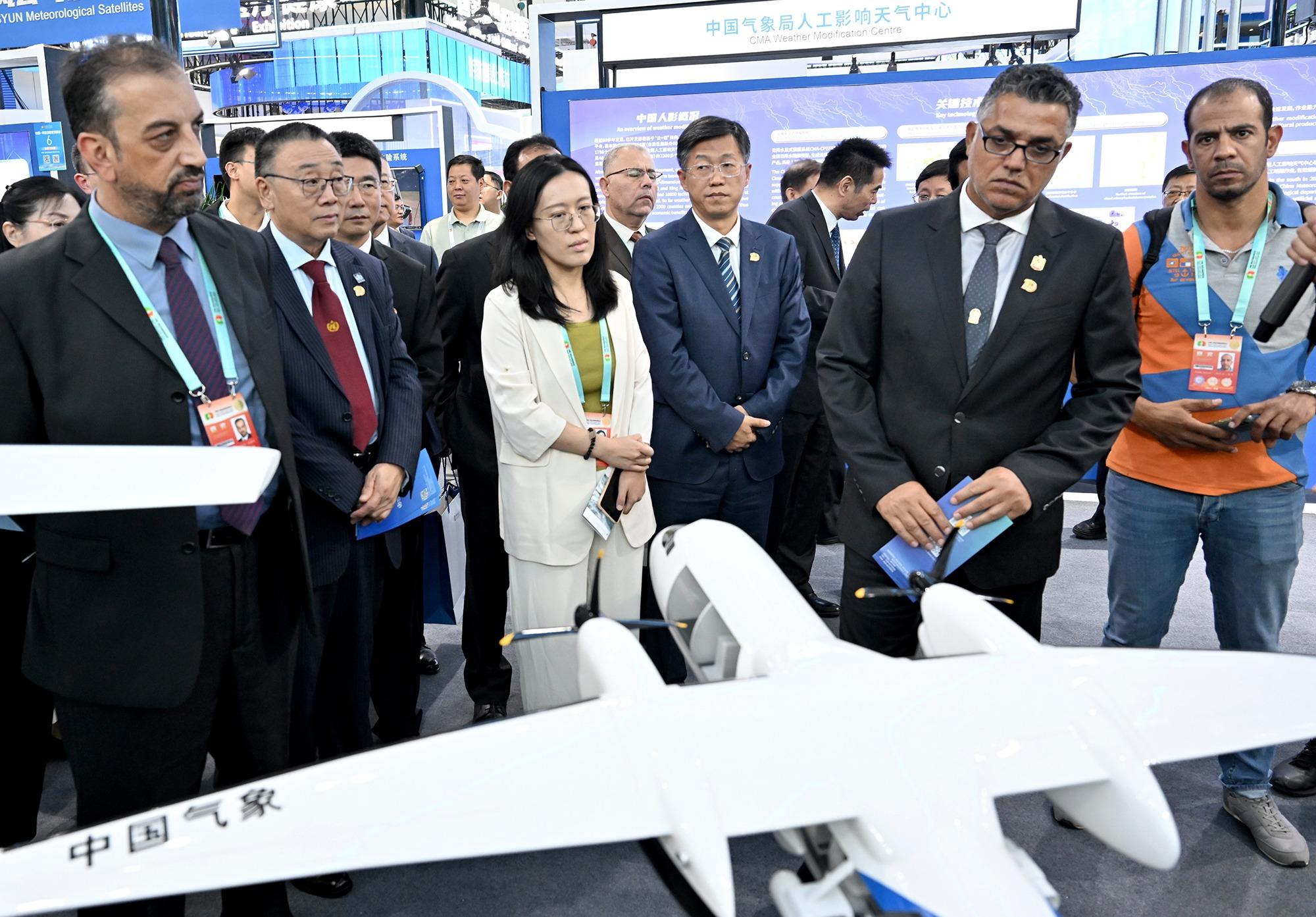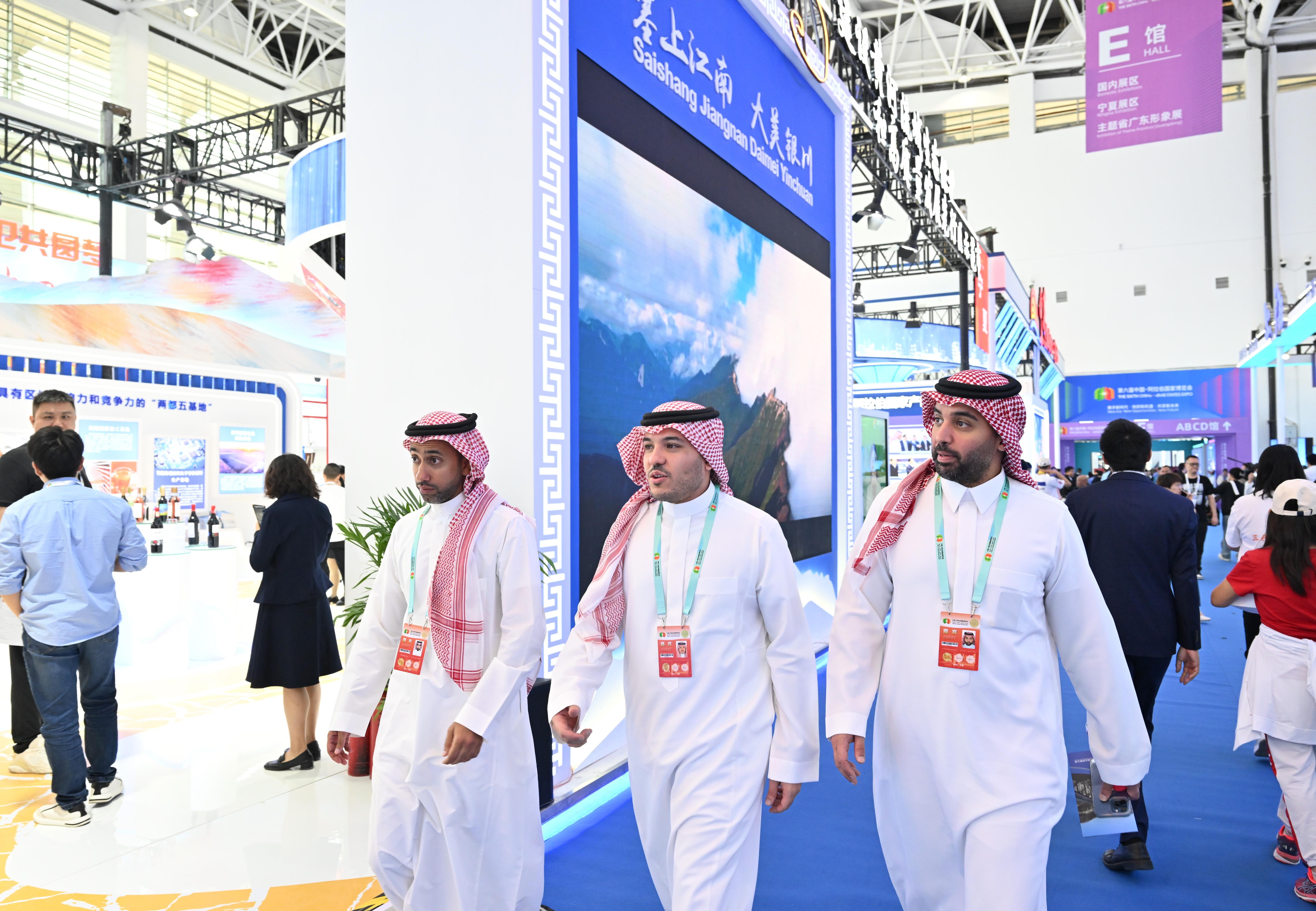Expo showcases breakthroughs in development, bright prospects for high growth
 Visitors exchange ideas on the wind turbine project at the clean energy exhibition area during the China-Arab States Expo in Yinchuan, Ningxia Hui autonomous region, on Sept 22, 2023. (PHOTO / XINHUA)
Visitors exchange ideas on the wind turbine project at the clean energy exhibition area during the China-Arab States Expo in Yinchuan, Ningxia Hui autonomous region, on Sept 22, 2023. (PHOTO / XINHUA)
China is helping transform the Arab world in a myriad ways, delivering socioeconomic development on an unprecedented scale and promising shared prosperity for the future — that was the takeaway consensus which emerged from the four-day biennial China-Arab States Expo held in late September in Yinchuan of the Ningxia Hui autonomous region in Northwest China.
Thanks to their engagement with China, nations spread across a landmass stretching from the United Arab Emirates in the Middle East to Mauritania on the western fringes of the vast Sahara Desert in North Africa are reaping (or set to reap) a slew of benefits.
These include the following: sustainable agricultural solutions for arid regions; development of high-tech and biomedicine; higher-level collaborations among participants of the Belt and Road Initiative; better economic relations; trade in consumer and industrial products as well as energy commodities and services; digital transformation of industry and business; and innovative currency settlements, said Ali bin Ibrahim Al-Malki, assistant secretary-general of the League of Arab States.
What is more, Arab countries are learning from China's efficient strategies for economic recovery and progress, he said.
A shining example of China-Arab States cooperation is the China-aided Mauritania Livestock Technology Demonstration Center, a vibrant oasis amid the sprawling desert. The center now boasts purple alfalfa and tall fescue that thrive across nearly a thousand acres.
"Mauritania's livestock industry acts as a cornerstone of the country's economy," said Zhang Hong'en, the center's director. "However, with 80 percent of its land dominated by desert known for its long dry spells, traditional grazing practices have wreaked havoc on the country's fragile ecosystems, creating a vicious cycle."
In pursuit of sustainable solutions, Chinese experts like Zhang have been heading to Mauritania since 2015 to introduce soil improvement techniques and implement innovative water-saving irrigation methods. Their sustained efforts have led to the introduction of a diverse array of 40 forage crop varieties, seeking the perfect match for this challenging environment.
The green revolution that ensued has breathed life into Mauritania's livestock industry, promising a sustainable future and ensuring good times for agriculture, Zhang said.
The demonstration center, a joint venture of China's Ministry of Commerce and Ningxia, is only one of many such achievements of the expo.
 Visitors gather at the smart meteorological equipment exhibition area during the China-Arab States Expo on Sept 21, 2023. (ZUO MINGYUAN / FOR CHINA DAILY)
Visitors gather at the smart meteorological equipment exhibition area during the China-Arab States Expo on Sept 21, 2023. (ZUO MINGYUAN / FOR CHINA DAILY)
Since the first expo in 2013, as many as 112 countries and regions, along with over 6,000 Chinese and foreign enterprises and 400,000-plus traders, have participated in the event. More than 1,200 cooperation projects of various types have been signed, spanning a range of industries. This year's expo saw exhibition venues cover 40,000 square meters, attracting 1,000 domestic and foreign businesses.
One of them, Palma, a Saudi Arabian dates firm and a first-timer at the expo, has set its sights on the vast Chinese market. It showcased its finest varieties of dates to attract consumers, especially the rising middle-income group, who are embracing healthier lifestyles and exploring diverse culinary experiences, said Abdullah Alrebdi, chairman of Palma.
China is now the Arab countries' largest trading partner. Their trade has almost doubled from the 2012 level to $431.4 billion last year. In the first half of this year, trade between the two sides neared $200 billion, data from the Ministry of Commerce showed.
"The bilateral trade has grown dramatically since 2018 despite China being confronted with numerous unfavorable situations like the global economic turmoil and the COVID-19 pandemic," said Zhao Jinping, former director-general of the Department of Foreign Economic Relations at the Development Research Center of the State Council. This bodes well for the creation of a long-term, safe and stable supply chain, he said.
Over the past 10 years, industrialized and higher value-added goods have gradually replaced raw materials and labor-intensive commodities in bilateral trade. The evolving partnership allows both sides to leverage their respective strengths, expertise and resources, and explore untapped potential, said Khaled Hanafi, secretary-general of the Union of Arab Chambers.
According to a report jointly released by the Chinese Academy of International Trade and Economic Cooperation and the Commerce Department of Ningxia, cooperation between China and the Arab world is deepening or growing on all fronts, including in established sectors like energy and infrastructure. Partnerships in new avenues like green low-carbon projects, healthcare, aerospace and the digital economy have also gained momentum.
For instance, Saudi Aramco, a petroleum and natural gas company, is proactively seeking cooperation in technology, R&D and innovation with its Chinese counterparts. Another goal is to harness the renewable energy potential of blue hydrogen, ammonia and synthetic fuels in the Arab world and reduce dependence on traditional fossil fuels, said Mutib Harby, Asia president of Saudi Aramco.
The company has set up an R&D center in China and established R&D partnerships with relevant institutes, said Harby. The Chinese government's strong commitment to industrial transformation and future industrial development has fostered an enabling environment for foreign businesses such as Aramco to invest in China and grow their business in the vibrant market.
 Foreign visitors at the exhibition venue during the China-Arab States Expo on Sept 21, 2023. (ZUO MINGYUAN / FOR CHINA DAILY)
Foreign visitors at the exhibition venue during the China-Arab States Expo on Sept 21, 2023. (ZUO MINGYUAN / FOR CHINA DAILY)
China's technologically advanced power generation technologies and related equipment in the sectors of wind power and photovoltaics are now ready to help Arab countries shift to a more sustainable energy system, said Xu Hongcai, deputy director of the China Association of Policy Science's Economic Policy Committee.
The Arab region is especially suited for the development of clean and renewable energy since it has some of the best solar and wind energy resources across the globe. China, on the other hand, has sophisticated technology and extensive experience in these areas, and can work with Arab nations to attain integrated development in the area of clean and renewable energy by complementing each other's capabilities, Xu said.
That will also contribute to global efforts for combating climate change, unlock economic opportunities and enhance energy security, he said.
Another area set to shine is digital cooperation, as highlighted by e-commerce, digital payments and supply chain digitalization, said Yan Lijin, chairman of China Silk Road Group.
Digitalization and local currency settlements are big themes now on the back of technological advances, higher trade volume, mutual trust and changes in the global economic system, Yan said.
Countries such as Egypt and the UAE have an urgent need for digital development, so helping Arab nations build their digital technology infrastructure will substantially facilitate Sino-Arab relations at governmental as well as business levels, besides bringing lifestyle conveniences like digital payments to consumers, Yan said.
That said, there are certain challenges in cross-border cooperation due to rising geopolitical tensions and sharper exchange rate fluctuations.
Since China and Arab nations are cooperating in commerce, investment and infrastructure, among others, there is an imperative to push ahead local currency settlements in both trade in goods and trade in services to minimize potential risks, officials and experts said.
The existing monetary system has been oriented to trade in goods. Although Chinese exports currently make up 30 percent to 40 percent of the global share, only 3.25 percent of international trade settlements are made in the Chinese renminbi, Yan said.
So, China is willing to work with Arab states to explore renminbi settlements for oil and gas trade, so as to safeguard the security and stability of global energy supply chain, said Zheng Jianbang, vice-chairman of the Standing Committee of the 14th National People's Congress, the country's top legislature.
Instead of avoiding a single currency, the first step should be to diversify the currencies with trading partners and attempt to settle in local currencies that are accepted by both parties, said Zou Jianglei, China chief executive officer of First Abu Dhabi Bank.
Trading partners can gradually adjust to currency diversification without significantly affecting their own currencies. With the expansion of trade and the growth of a particular currency usage between the two sides, they can arrive at the convergence of major currencies for trade settlement. It would be a new path worth trying for both sides, Zou said.
An Ming, governor of the Shanghai branch of Bank of Africa, said trading in local currencies helps create a better economic and trade environment conducive to sustainable growth by lowering currency exchange costs and reducing the risk of exchange rate fluctuations. This improves the stability and predictability of cross-border trade while encouraging two-way investment.
A close working relationship between Chinese and Arab banks would help promote financial stability, lessen dependence on intermediary currencies and boost bilateral economic connections, An said, adding robust infrastructure and systems are required to simplify transactions and offer safe and effective clearing services.
The China-Arab States Expo, held in Yinchuan for six straight times, has emerged as an important platform for China's opening-up. A pilot zone based in Ningxia could be a practical and effective way to explore local currency settlements between China and the Arab world, An said.
Contact the writers at wangkeju@chinadaily.com.cn


